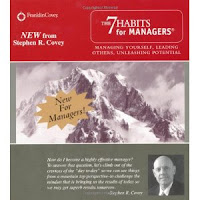
"Managing yourself, leading others, unleashing potential" was the sub-title for a two-day workshop I attended two weeks ago; kind of intimidating, but it ended up being very informative and engaging. The workshop was based on Stephen Covey's "7 Habits for Highly Effective People," but it was tailored to managers. I really felt that the 7 habits for managers were definitely applicable to anyone who's ever had to manage anything even a project, a family, the household, yourself :) The habits aren't novel or new, but are based on principles and are laid out in a way that's easy to follow and understand. I had heard about the 7 habits a while back and even picked up the book a few times, but I never really knew what it entailed. I would recommend it if you get a chance to attend a workshop or even read one of Covey's books. I'm trying to see if I can get access to some of the video clips showed during my workshop to illustrate some of the principles. I did get electronic copies of the templates used as tools for some of the habits that I think you folks might find useful and will pass those on; many of them deal with time management and project planning. So here are the first 3 habits, in a nutshell (a very small shell - maybe pistachio or sunflower :)):
The premise behind the first 3 habits is that you can't manage anything unless you can manage yourself so these are principles to help manage yourself first:
Habit 1: Be Proactive: see alternatives not roadblocks, use your R&I (resourcefulness and initiative), focus on your circle of influence; don't dwell in your circle of concern.
Mediorce responses for Habit 1: "That's the best we can do given our resources."
Effective response for Habit 1: "There's always a way to get it done."
Habit 2: Begin With the End in Mind: define the unique contribution you want to make, define practical outcomes everywhere, every time.
Mediocre response for Habit 2: "I follow agendas set by others."
Effective response for Habit 2: "I have a clear vision of what I want to accomplish."
Habit 3: Put First Things First: focus on the important not just the urgent, set a few "wildly important" goals (must get done), plan weekly and act daily.
Mediocre response for Habit 3: "I can do it all-bring it on."
Effective response for Habit 3: "I organize and execute around my highest priorities."
To be continued . . . I figured I'd blog about it in segments so you can think alittle about each habit without being bombarded with too much info. at one time.

Comments